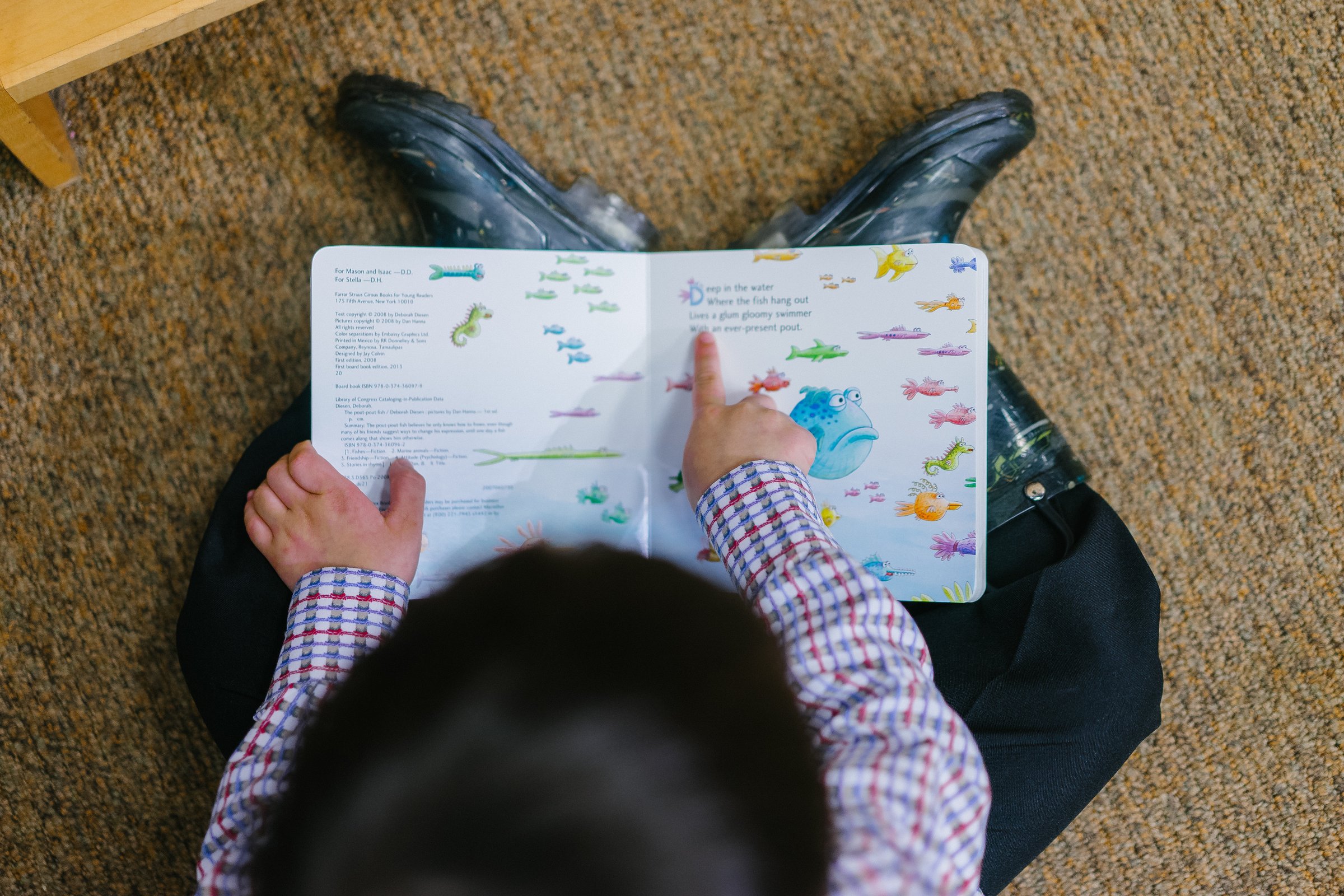Reimagining Child Care in America
How a coalition of parents and caregivers are spearheading a grassroots movement to rebuild America’s fractured child care system.

Corinne DePersis didn’t set out to become an early childhood activist. Rather, her experience as a mother thrust her into the role.
DePersis’s oldest daughter, Madeleine, was born with Pitt-Hopkins Syndrome, a rare condition that causes significant cognitive and motor skill delays. Raising a child with a complex genetic disorder is challenging on its own. When DePersis began looking for an early child care program for Madeleine, the level of difficulty increased by an order of magnitude.
DePersis had hoped to enroll her daugther in a preschool cooperative near her home in Denver, CO. “It was affordable, diverse and seemed like a great opportunity,” she said. But when the co-op learned of Madeleine’s developmental issues, “we were shut down real quick. It was disheartening and humiliating.”
It was also a bit surprising, since Madeleine didn’t have any complex medical needs. “The most complicated issue she had was that she wore glasses,” DePersis said. She eventually found a program to accept Madeleine, but it only offered 10 hours of care per week. “We made it work,” she said. “But for a lot of families, it would have been impossible.”
After hearing about DePersis’s journey, a friend invited her to share her story at a town hall focused on rethinking Colorado’s early child care system. At first, DePersis was hesitant. The town hall would be attended by roughly 300 people, including Colorado governor Jared Polis. But after some coaxing, she decided to attend. The experience was eye-opening.
“I didn’t realize how hard early child care was all across the board,” she said. “When Madeleine was rejected, there was a lot of shame, so we didn’t talk about it. Because of that, I didn’t hear other parents’ stories.” Now an engaged early child care advocate and activist, DePersis is working to encourage other parents to share their stories. “It’s intimidating when you’re talking about a system that is so hard to navigate.” But, she said, “Parents need to be heard.”
Reshaping a Shattered System
Melissa Mares is a senior policy advisor for the Colorado Children’s Campaign, the nonprofit, nonpartisan advocacy group that co-hosted the town hall where DePersis gave her testimony. As a former kindergarten teacher, Mares recalls sitting across from parents wracked with guilt over their child’s unpreparedness for kindergarten. “It’s not their fault,” she said. “Parents shouldn’t feel shame. It’s the system that needs to be fixed.”
In 2022, the deficiencies of America’s early child care system are universally recognized. There is a shortage of care providers, particularly in rural and low-income communities. In places where high-quality care is available, it’s often exorbitantly expensive. Paradoxically, many early child care workers don’t earn a living wage. According to the 2020 Early Childhood Workforce Index from the Center for the Study of Child Care Employment, the average child care worker makes $11.65 per hour.
Child care has been in crisis for years, but the pandemic pushed it to the brink of collapse. When care providers shut their doors in 2020, thousands of low-wage workers lost their jobs. Meanwhile, essential workers who couldn’t work from home were suddenly deprived of vital child care. In both groups, Black and Brown families were disproportionately impacted.
“Women of color are our primary caregivers, and they are underpaid and not respected,” Mares said. “If we could shift our culture to one that values caregiving not only economically, but for how it teaches kids to be human, it would transform how we are in community with each other.”
By amplifying the voices of caregivers and parents, the Colorado Children’s Campaign is making headway in reforming the system in Colorado. One major milestone arrives on April 25, when Governor Jared Polis will sign HB 22-1295 into law. In addition to establishing the responsibilities of the state’s new Department of Early Childhood—another initiative supported by the Colorado Children’s Campaign—the bill will create a no-cost preschool program for Colorado. “This will realize the vision of transformative systems-level change in Colorado with the needs of parents, caregivers, and providers at the center of our reimagined early childhood system,” Mares said of the legislation.
Corinne DePersis has served on two groups involved with Colorado’s transition to the new Department of Early Childhood. A couple of years ago, she couldn’t have imagined being involved in such important policy discussions around child care. “Talking about a system that is so hard to navigate is hard,” she said. It can be especially intimidating when you’re in a room of people all using the same jargon.” DePersis credits groups like the Colorado Children’s Campaign for “providing a safe space for families to build their confidence to speak out.”

A Foundation for Transformation
As a nonprofit, the Colorado Children’s Campaign relies on outside funding to do its work. In 2020, it added a new major grantor to its list: the Raising Child Care Fund (RCCF), which funnels private foundation funds to nonprofits focused on organizing people with lived experience to transform the child care system.
Rachel Schumacher, the former appointed Director of the Office of Child Carer for the Obama administration, serves as RCCF’s project director. She says that after years of failed top-down policies, it became clear that something critical was missing. “So much money was being put into early childhood grantmaking, and we weren’t seeing transformative change,” she said. “And we ended up realizing that a lot of funders had never invested in grassroots organizing centering parent and early educator voices.”
The Early Childhood Funders Collaborative—a national collaborative of more than 50 funders committed to investing in systems change for young children and their families—launched RCCF in 2019. A few months later, the global pandemic wreaked havoc on an already-fragile child care system. “The system that is basically built on the razor’s edge in terms of program budgets, and it just fell apart when programs shuttered and the child care workforce sustained major layoffs,” Schumacher said. Meanwhile, George Floyd’s murder by a Minneapolis police officer sparked a national reckoning with racism. “We knew we needed to transform the system,” Schumacher said. “And we knew that doing it this way would support Black and brown voices being heard.”
A key goal at RCCF is to support what Schumacher calls “power-sharing and coalition building.” For example, the Colorado Children’s Campaign brought the Colorado Statewide Parents Coaltion to the table, recommending them to RCCF for funding. “It’s a great model for how advocacy groups can share power with lesser-known groups led by parents, early educators, and people of color,” she said.
Family Forward Oregon is another RCCF grantee that employs the power-sharing model. According to FFO Executive Director Andrea Paluso, this is particularly important in a state where systemic inequities severely limit opportunities and access for families of color. “We have created systems that track poor women and immigrant women into care work that is often not seen as professional labor,” she said. “And this is important work. Care is work, and it should be recognized as such.”
Care is work, and it should be recognized as such.
Family Forward Oregon uses a portion of its RCCF funds to award subgrants to organizations representing historically oppressed groups such as APANO, the Asian Pacific Network of Oregon. Marchel Marcos, political director at APANO, is a mother of two who has experienced the inequities of the child care system firsthand. She said she is encouraged to see funders finally putting power in the hands of people most affected by the system. “Most people making the policies don’t use the services,” she said. “You need to know from the ground-level what obstacles people are experiencing, and those people need to share those experiences.”
The efforts of APANO and Family Forward Oregon have helped to establish a Department of Early Learning and Care in Oregon, similar to the one in Colorado. Paluso says the department will help streamline the state’s child care system, but that there’s still much work to be done. For example, early child care providers still need more funding, and paid family and medical leave needs to be implemented more equitably. The only way to achieve these goals? By mobilizing parents and care providers, and giving them the tools to build a system that is affordable, equitable, and accessible.
We don’t need incremental tweaks, we need transformation—and that requires grassroots organizing and power-building.
“If the institutional decision-makers thought this was needed, they would have done it already,” she said. “We don’t need incremental tweaks, we need transformation—and that requires grassroots organizing and power-building.”
Bezos Family Foundation is a proud partner of the Raising Childcare Fund, to better insert voices of parents and early educators into the federal policy debate about saving the child care industry and rebuilding toward a better and more equitable system, and support new groups working to increase equity within the child care system.